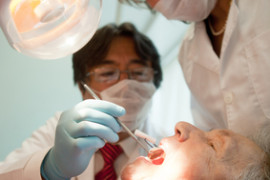Many studies in recent years have analyzed the ways in which periodontal pathogens travel through the body and incite an immune response that elevates risk for heart disease.
In an effort to learn more about the specific mechanisms behind the oral-cardiovascular connection, researchers in Europe conducted a study with mice models to uncover the pathway by which oral bacteria in the bloodstream affect endothelial progenitors. Endothelial progenitors are cells that can turn into endothelial cells, which make up the walls of blood vessels.
The researchers found that the presence of oral pathogen Porphyromonas gingivalis in the bloodstream corresponded with a significant movement of endothelial progenitors from the bone marrow—where the cells are created—to the blood stream. These cells are released into the bloodstream in order to help maintain the health of the vessel walls.
Seems like a good thing, right? When potentially harmful pathogens are present, the body responds with an increase in cells that are able to “regenerate” the endothelial cells. However, the study authors noted [emphasis added]:
“Impaired endothelial regeneration after endothelial cell damage—as known to be elicited by periodontal pathogens—is closely connected to the development of atherosclerotic lesions.”
So it appears that, once again, P. gingivalis is able to impair the body’s response to infection.
The authors noted that this effect was “dependent on Toll-like receptor 2, the receptor primarily mediating the invasion of P. gingivalis into host cells.” Previous studies have shown that P. gingivalis is able to side-step the immune response by blocking the immune system, while simultaneously elevating and enhancing the body’s response with inflammation through toll-like receptors.
So for now, the extent to which P. gingivalis affects the process of endothelial regeneration is uncertain. More research is needed to confirm and explain this phenomenon and to determine how this translates to a human model.
Source: Mobilization of Endothelial Progenitors by Recurrent Bacteremias with a Periodontal Pathogen



